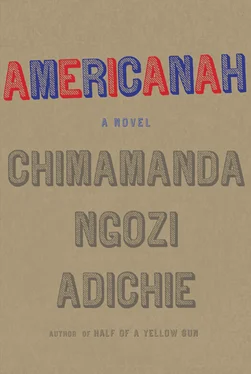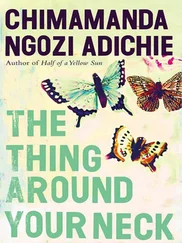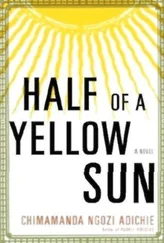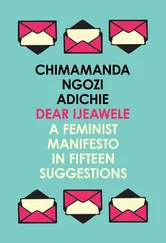“Okay, Edusco,” Obinze said, suddenly feeling drained. “I am not going to eat the land if I don’t sell it.”
Edusco looked startled. “You mean you agree to my price?”
“Yes,” Obinze said.
After Edusco left, Obinze called Ifemelu over and over but she did not answer. Perhaps her ringer was switched off, and she was eating at her dining table, wearing that pink T-shirt she wore so often, with the small hole at the neck, and HEARTBREAKER CAFÉ written across the front; her nipples, when they got hard, would punctuate those words like inverted commas. Thinking of her pink T-shirt aroused him. Or perhaps she was reading in bed, her abada wrapper spread over her like a blanket, wearing plain black boyshorts and nothing else. All her underwear were plain black boyshorts; girly underwear amused her. Once, he had picked up those boyshorts from the floor where he had flung them after rolling them down her legs, and looked at the milky crust on the crotch, and she laughed and said, “Ah, you want to smell it? I’ve never understood that whole business of smelling underwear.” Or perhaps she was on her laptop, working on the blog. Or out with Ranyinudo. Or on the phone with Dike. Or perhaps with some man in her living room, telling him about Graham Greene. A queasiness roiled in him at the thought of her with anybody else. Of course she would not be with anyone else, not so soon. Still, there was that unpredictable stubbornness in her; she might do it to hurt him. When she told him, that first day, “I always saw the ceiling with other men,” he wondered how many there had been. He wanted to ask her, but he did not, because he feared she would tell him the truth and he feared he would forever be tormented by it. She knew, of course, that he loved her but he wondered if she knew how it consumed him, how each day was infected by her, affected by her; and how she wielded power over even his sleep. “Kimberly adores her husband, and her husband adores himself. She should leave him but she never will,” she said once, about the woman she had worked for in America, the woman with obi ocha . Ifemelu’s words had been light, free of shadow, and yet he heard in them the sting of other meanings.
When she told him about her American life, he listened with a keenness close to desperation. He wanted to be a part of everything she had done, be familiar with every emotion she had felt. Once she had told him, “The thing about cross-cultural relationships is that you spend so much time explaining. My ex-boyfriends and I spent a lot of time explaining. I sometimes wondered whether we would even have anything at all to say to each other if we were from the same place,” and it pleased him to hear that, because it gave his relationship with her a depth, a lack of trifling novelty. They were from the same place and they still had a lot to say to each other.
They were talking about American politics once when she said, “I like America. It’s really the only place else where I could live apart from here. But one day a bunch of Blaine’s friends and I were talking about kids and I realized that if I ever have children, I don’t want them to have American childhoods. I don’t want them to say ‘Hi’ to adults, I want them to say ‘Good morning’ and ‘Good afternoon.’ I don’t want them to mumble ‘Good’ when somebody says ‘How are you?’ to them. Or to raise five fingers when asked how old they are. I want them to say ‘I’m fine, thank you’ and ‘I’m five years old.’ I don’t want a child who feeds on praise and expects a star for effort and talks back to adults in the name of self-expression. Is that terribly conservative? Blaine’s friends said it was and for them, ‘conservative’ is the worst insult you can get.”
He had laughed, wishing he had been there with the “bunch of friends,” and he wanted that imaginary child to be his, that conservative child with good manners. He told her, “The child will turn eighteen and paint her hair purple,” and she said, “Yes, but by then I would have kicked her out of the house.”
At the Abuja airport on his way back to Lagos, he thought of going to the international wing instead, buying a ticket to somewhere improbable, like Malabo. Then he felt a passing self-disgust because he would not, of course, do it; he would instead do what he was expected to do. He was boarding his Lagos flight when Kosi called.
“Is the flight on time? Remember we are taking Nigel out for his birthday,” she said.
“Of course I remember.”
A pause from her end. He had snapped.
“I’m sorry,” he said. “I have a funny headache.”
“Darling, ndo. I know you’re tired,” she said. “See you soon.”
He hung up and thought about the day their baby, slippery, curly-haired Buchi, was born at the Woodlands Hospital in Houston, how Kosi had turned to him while he was still fiddling with his latex gloves and said, with something like apology, “Darling, we’ll have a boy next time.” He had recoiled. He realized then that she did not know him. She did not know him at all. She did not know he was indifferent about the gender of their child. And he felt a gentle contempt towards her, for wanting a boy because they were supposed to want a boy, and for being able to say, fresh from birthing their first child, those words “we’ll have a boy next time.” Perhaps he should have talked more with her, about the baby they were expecting and about everything else, because although they exchanged pleasant sounds and were good friends and shared comfortable silences, they did not really talk. But he had never tried, because he knew that the questions he asked of life were entirely different from hers.
He knew this from the beginning, had sensed it in their first conversation after a friend introduced them at a wedding. She was wearing a satin bridesmaid’s dress in fuchsia, cut low to show a cleavage he could not stop looking at, and somebody was making a speech, describing the bride as “a woman of virtue” and Kosi nodded eagerly and whispered to him, “She is a true woman of virtue.” It surprised him, that she could use the word “virtue” without the slightest irony, as was done in the badly written articles in the women’s section of the weekend newspapers. The minister’s wife is a homely woman of virtue . Still, he had wanted her, chased her with a lavish single-mindedness. He had never seen a woman with such a perfect incline to her cheekbones that made her entire face seem so alive, so architectural, lifting when she smiled. He was also newly rich and newly disoriented: one week he was broke and squatting in his cousin’s flat and the next he had millions of naira in his bank account. Kosi became a touchstone of realness. If he could be with her, so extraordinarily beautiful and yet so ordinary, predictable and domestic and dedicated, then perhaps his life would start to seem believably his. She moved into his house from the flat she shared with a friend and arranged her perfume bottles on his dresser, citrusy scents that he came to associate with home, and she sat in the BMW beside him as though it had always been his car, and she casually suggested trips abroad as though he had always been able to travel, and when they showered together, she scrubbed him with a rough sponge, even between his toes, until he felt reborn. Until he owned his new life. She did not share his interests — she was a literal person who did not read, she was content rather than curious about the world — but he felt grateful to her, fortunate to be with her. Then she told him her relatives were asking what his intentions were. “They just keep asking,” she said and stressed the “they,” to exclude herself from the marriage clamor. He recognized, and disliked, her manipulation. Still, he married her. They were living together anyway, and he was not unhappy, and he imagined that she would, with time, gain a certain heft. She had not, after four years, except physically, in a way that he thought made her look even more beautiful, fresher, with fuller hips and breasts, like a well-watered houseplant.
Читать дальше












